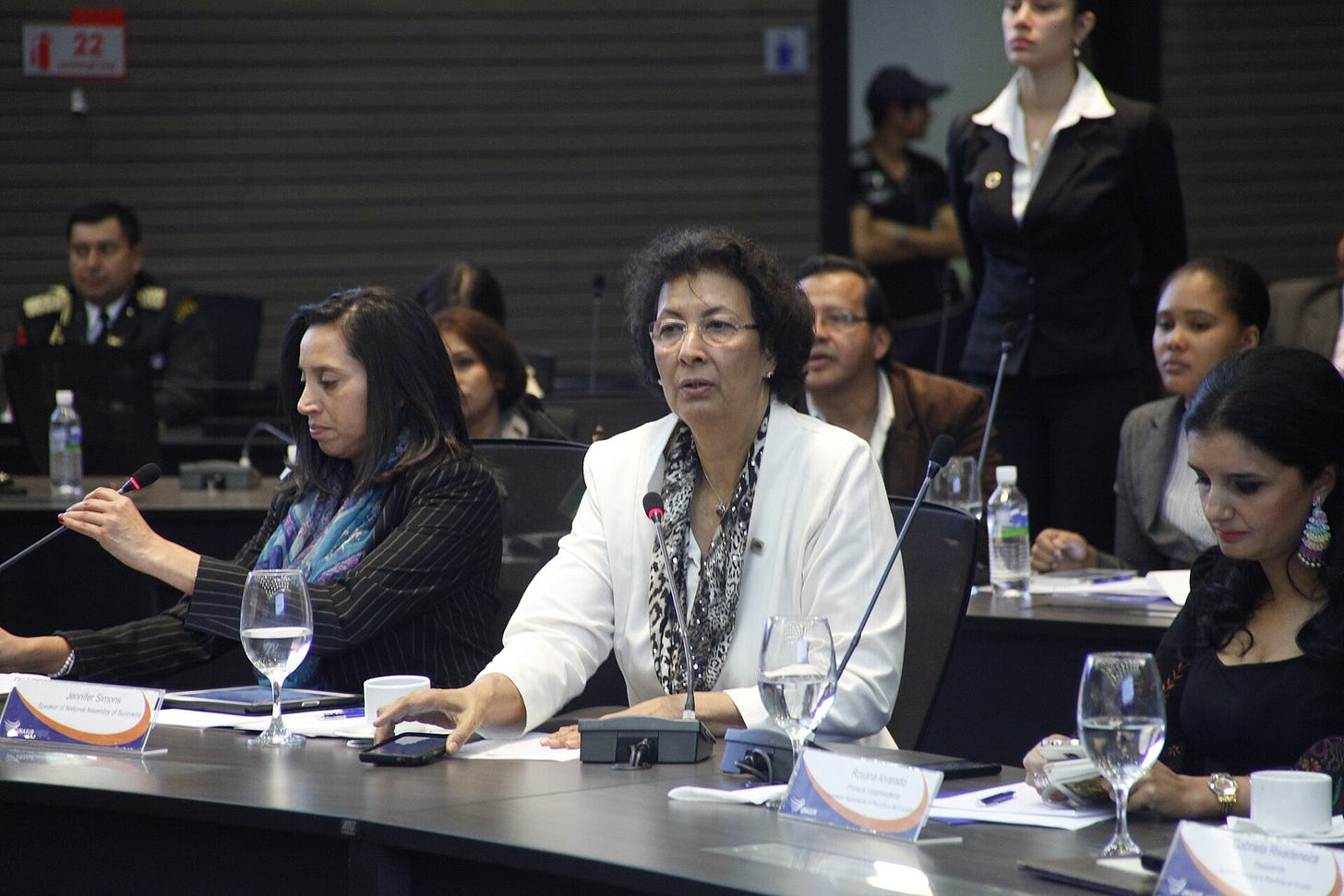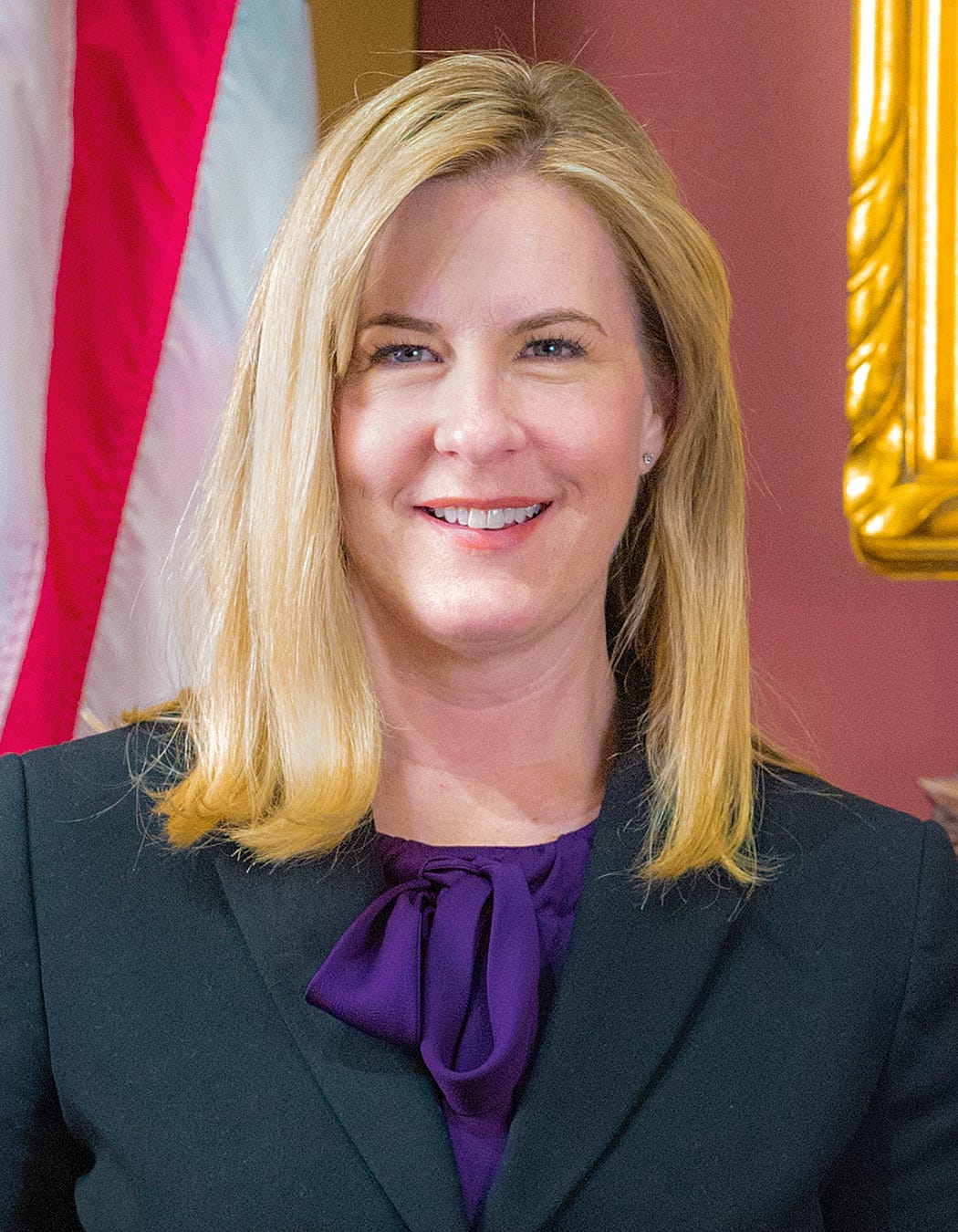How parties can increase women in their ranks, a first in Guernsey and Suriname and more: All the important updates about women in politics from June
#WomenLead (Issue 163): Your monthly round-up on women in politics
Hello, and welcome to the June 2025 edition of #WomenLead!
In June, the World Economic Forum released its annual rankings on the Global Gender Index. Launched in 2006, the index ranks countries on four sub-indices: Economic Participation and Opportunity, Educational Attainment, Health and Survival, and Political Empowerment.
Regular readers of #WomenLead are likely to know this even without having looked at the scores – across the globe, political empowerment remains the sphere with the widest gender gap, the index has found year after year. There has been progress for sure, but the world has much more work to do on that front. We keep holding on to hope!
In this month’s edition, we bring you updates from Australia, Burundi, Guernsey, India, Kenya, Latvia, Suriname, USA and more. In case you missed last month’s wrap, it is available here.
Election Watch
Tracking women among candidates and winners
🇧🇮BURUNDI: Burundi went to polls last month for a parliamentary election that has been termed as one without an opposition by Human Rights Watch. Women comprise 39.6 percent of MPs post the election, a small improvement compared to the previous polls of 2020, when their share was 38.2 percent, as per data from the Inter-Parliamentary Union.
🇱🇻LATVIA: On June 07, Latvia held elections at the municipal level. Women comprise 28.7 percent of the 42 elected representatives, data from Latvia’s official statistics website shows. This is marginally lower from the previous election in 2021, when the share of women elected was 30.5 percent. Among mayors heading local governments, women’s share is significantly lower – only 11.9 percent. The chart below shows how the share varies across cities (Vīrieši means men, and Sievietes refers to women in the legend)

Leaders
Updates about women leading countries, states and movements

In Suriname, Jennifer Geerlings-Simons is all set to take over as the country’s next President, and will become the first woman to do so. Geerlings-Simons' National Democratic Party (NDP) won the largest number of seats in Parliamentary polls held during the last week of May. In the subsequent days, they found support from five other parties and secured the required majority to form government.
Read: A woman’s burden? A historic change in Suriname’s presidency, Global Voices
Guernsey, a self-governing dependency of the British Crown, has elected its first-ever female Chief Minister – Lindsay De Sausmarez. De Sausmarez, previously the Environment and Infrastructure President, received the highest number of votes in a June legislative election, and was chosen by the newly elected deputies as the Chief Minister. She was first elected as a deputy in 2016, and is seen as “a keen environmentalist” and also supported the modernisation of Guernsey's abortion law.
#NotTheCost
Because violence should never be the cost
In the USA's Minnesota, representative Melissa Hortman was killed along with her husband in what appears to be a politically motivated shooting on June 14. They were killed at their home by a man impersonating a police officer. Another politician, Senator John Hoffman, and his wife, were also shot at later in the day and were left wounded. Hortman was a member of the Democratic Party and represented Minnesota House District 34B. The couple leave behind two children.

Remembering Hortman’s political career, the Associated Press notes:
“Hortman, who was first elected in 2004, helped pass an expansive agenda of liberal initiatives like free lunches for public school students during the momentous 2023 session as the chamber’s speaker, along with expanded protections for abortion and trans rights. With the House split 67-67 between Democrats and Republicans this year, she yielded the gavel to a Republican under a power-sharing deal, took the title speaker emerita, and helped break a budget impasse that threatened to shut down state government.”
On-the-job Updates
Spotlighting women’s experiences in political office
On June 1, Abdi Guyo, the governor of Isiolo county in Kenya, dismissed a request from Senator Fatumo Dullo to allocate funds for development. He said he would not give her a single cent, alleging that she was using the money to lead a lavish lifestyle and she was using public funds for “questionable deals”. He went on to say that she was using the money for “keeping a young man”. Of course, he couldn’t have stopped – he claimed that despite keeping this man, the Senator was always moody and angry every morning, and that the man was not doing his job well.
We must say, that’s quite a lot of garbage to utter!
Both leaders have had their disagreements on how to run the county. In the past, Dullo has expressed her fear that there may have been a plot to kill her. Women leaders in the country are naturally angry. They are demanding a public apology from Guyo. In a statement, Senator Veronica Maina, who leads the Kenya Women Senators Association, said:
“This is a blatant attempt to frustrate, demean and intimidate Senator Fatuma, and it must be called out for what it is. These remarks perpetuate dangerous stereotypes with the aim of discouraging women’s participation in public life.”
It’s good to see the solidarity, but quite a shame to see this gutter-level discourse. We hope there will be corrective action.
Inside the Ranks
Examining the space for women’s participation within political parties
In June, the Indian National Congress named a set of 40 new district presidents for the state of Gujarat. It included 39 men, and one woman. Sonal Patel, who was appointed to the post in Ahmedabad city, expressed her disappointment and said she was expecting at least three to four women to make the cut. A few women had been shortlisted, but only Patel made it to the final list. The Congress’s list is not very different from that of the Bharatiya Janata Party (BJP Gujarat), whose cohort of district presidents and secretaries for the state includes only two women among 41 names.
But this is not a Gujarat-only pattern. From elected representatives to party candidates, to party members and officials, women remain a minority in India’s political spaces. In 2023, India passed a law that will reserve a third of seats in the national and state legislatures for women. The law is yet to come into effect. Earlier this month, the Indian government indicated that it is likely to be implemented in the next Parliamentary election of 2029.
But how are political parties preparing for this (or are they?). In this article, we list out five steps that they can start taking immediately to expand the space for women and to build and nurture a steady supply of powerful and influential women leaders.
Staying on what parties can/should do, fresh from a “bruising election loss”, Australia’s Liberal Party is currently deliberating on how to improve women’s participation in its own ranks. Melissa McIntosh, the shadow minister for women, has “called for a cultural overhaul of the Liberal Party, including bringing in experts on "organisational and gender equality design" to radically reshape it to better support women”, as per a report in ABC News.

In May, Sussan Ley took over as the Party’s leader, replacing Peter Dutton. This was the first time the party had chosen a woman to lead. Ley has said that she would be a “zealot” when it came to recruiting more women in the party. We’ll be watching the developments keenly!
For more context, read: The Liberals’ women problem may seem intractable, but here’s what they could learn from the Teals, The Conversation
Reading List
The more one learns, there’s only more to learn
“Nigerian children don’t imagine women as political leaders: what shapes their view”: The Conversation
“The anti-anti-feminist election [in South Korea]”: The Atlantic
“Gender and the 2025 Singapore general elections”: The Diplomat
“What does a parity parliament in Australia mean for the Pacific?”: Devpolicy Blog
“How Jacinda Ardern changed the look of leadership”: Vogue
“Behind the curtain of empowerment: Panchayat dramas and proxy politics”: The Arunachal Times
Community Watch
A quick round-up from the community working at the intersection of gender x politics
Earlier in June, over 60 parliamentarians and experts from Europe and Central Asia gathered at the Finnish Parliament for a workshop on gender-sensitive parliaments, organized by the OSCE Office for Democratic Institutions and Human Rights (ODIHR). At the workshop, participants endorsed the Helsinki Pledges on Gender-sensitive Parliaments in the OSCE Region. According to the workshop’s organisers, the pledges “call on national parliaments to commit to working towards gender-sensitive parliaments and targeted action to realise this aim in all their functions, from representation through lawmaking, to oversight”.
The pledge and the details of the workshop are available here.
That’s a wrap for this month! Liked this edition? Then press the ❤️ button and show us some love! And please, please do share this with a friend or on your social media accounts. There’s frankly nothing quite like reader love and endorsement, so please keep it coming! Thank you!
Disclaimer: #WomenLead is a non-partisan newsletter produced in a personal capacity, and does not reflect any institutional affiliation/opinion. In case of any questions, please drop in a message at womenlead.project@gmail.com.



